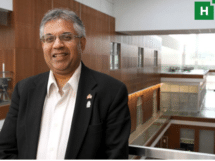‘To consider something a miracle cure, you need much larger numbers of patients being treated, being followed up for a much longer time, and results analyzed,’ DR C S Pramesh tweeted.
Earlier this week, a drug called Dostarlimab wiped out rectal cancer in a small group of patients who took it for about six months, making it a major breakthrough that amazed and excited the world.
The development has been dubbed “remarkable” by Dr C.S. Pramesh, Director Tata Memorial Hospital; Division of Surgical Oncology in a series of tweets.
 “A drug called dostarlimab, an anti–PD-1 monoclonal antibody (immunotherapy), was given every three weeks for 6 months in patients with a subgroup of patients with rectal cancer (stage II or III, mismatch repair–deficient or MMR-deficient),” Dr Pramesh posted on the microblogging site.
“A drug called dostarlimab, an anti–PD-1 monoclonal antibody (immunotherapy), was given every three weeks for 6 months in patients with a subgroup of patients with rectal cancer (stage II or III, mismatch repair–deficient or MMR-deficient),” Dr Pramesh posted on the microblogging site.
“Now, this is remarkable, and is the reason why there is a lot of excitement in the oncology community about the results,” he added.
Dr Pramesh further said that calling the drug a miracle cure which will impact “the way we treat cancer globally is premature, and even fanciful.”
“First, the study (which was phase 2) was done on just 12 patients. To consider something a miracle cure, you need much larger numbers of patients being treated, being followed up for a much longer time, and results analyzed. Preferably in a large phase 3 randomized trial,” Dr Pramesh wrote.
“Second, MMR-deficient rectal cancers account for <10% of all rectal cancers – this subgroup of patients was selected because they are exquisitely sensitive to immunotherapy. Which means that the results are applicable to a small proportion of all patients with rectal cancer (sic),” he said.
The cost of treatment, Dr Pramesh added, is not trivial. “Overall treatment costs of 9 doses of the drug (which were given during the study) is expected to range anywhere from Rs 50,00,000 to 1,00,00,000 (100,000 USD), which puts it out of reach for most patients in LMICs,” he said.
The trial
Doctors carried out the trial at New York’s Memorial Sloan Kettering Cancer Center and it saw all traces of tumor disappearing from the patients suffering from rectal cancer. Some scientists said these kinds of results have never been seen in the history of cancer research. Details of the trial were published in the New England Journal of Medicine.
The trial has been hailed as a first in cancer treatment, with one of the paper’s authors, Dr Luis Diaz Jr of Memorial Sloan Kettering, telling the New York Times that he knew of no other study in which a treatment completely obliterated cancer in every patient.
“I believe this is the first time this has happened in the history of cancer,” he said.

















